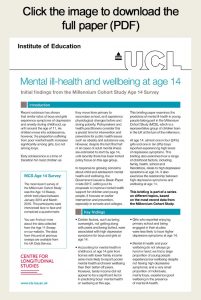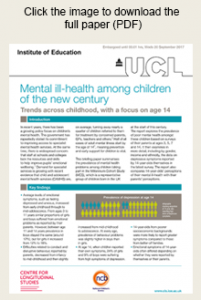MCS Age 14 initial findings
Through the Millennium Cohort Study we have been following the lives of over 19, 500 children since they were born in the UK at the turn of the new century. We carry out regular surveys to collect information about participants’ physical, socio-emotional, cognitive and behavioural development over time, alongside detailed information on their daily life, behaviour and experiences.
The most recent survey took place when participants were aged 14. Between now and April 2018, we will be publishing our initial findings from the age 14 survey. These will cover a range of themes, from levels of obesity to teenage aspirations. You can read them here:

Mental ill-health and wellbeing at age 14
This paper highlights how:
- Certain factors, such as being overweight, not getting along with peers and being bullied, were associated with high depressive symptoms for boys and girls at age 14.
- At at age 14, girls from homes with lower family income were more likely to report poorer mental health and lower wellbeing than their better-off peers.
- Girls who enjoyed primary school and felt engaged in their studies were less likely to have higher depressive symptoms at age 14.
- Mental ill-health and poor wellbeing do not always go hand in hand: a large proportion of young people experienced low wellbeing despite not having high depressive symptoms; and a very small proportion of individuals, mainly boys, experienced good wellbeing in the presence of mental ill-health.
Read the briefing paper here.
Risky behaviours: prevalence in adolescence
 This paper explores:
This paper explores:
- How common risk-taking behaviour is among teenagers in the UK.
- Which risky activities teenagers are more likely to get involved in, including substance use and anti-social behaviour.
- How risky behaviours differ according to teenagers’ backgrounds.
Read the briefing paper
Reading the full working paper, Determinants of risky behaviours in adolescence
What influences vocabulary?
This paper investigates:
- the extent to which parents’ English language skills are passed on to their children,
- the influence of factors like parents’ level of education and ethnicity on children’s language development, and
- the association between reading for pleasure and young people’s level of vocabulary.
Read the briefing paper.
Read the full working paper, The intergenerational transmission of vocabulary
 Child overweight and obesity
Child overweight and obesity
This paper reveals:
- 20 per cent of MCS participants were obese at age 14 and a further 15 per cent were overweight.
- Between 11 and 14, most participants stayed in the same weight category. Boys were slightly more likely to have become normal weight than overweight or obese, while the opposite was the case for girls.
- 14-year-olds whose mothers had a low level of education were more likely to be of excess weight than those whose mothers had a degree.
Read the briefing paper.
Read the full working paper, Child overweight and obesity – initial findings from the Millennium Cohort Study Age 14 Survey
The university and occupational aspirations of UK teenagers
This paper shows:
- Girls thought they had a 71 per cent chance of going to university, and 14 per cent of girls were 100 per cent certain they would go
- Boys were less sure; their average expectation was 63 per cent, and just under 10 per cent were absolutely convinced they would get to university.
- Compared to boys, the average hourly wage for the occupations that girls aspired to was a striking 27 per cent or £6.49 lower.
Read the briefing paper
Read the full working paper, ‘Is the future female? Educational and occupational aspirations of teenage boys and girls in the UK’
Mental ill-health among children of the new century

This paper found:
- 24 per cent of girls and 9 per cents of boys were depressed at age 14.
- 14-year-olds from better-off families were less likely to have high levels of depressive symptoms compared to their peers from poorer homes.
- Emotional symptoms of 14-year olds often differed depending on whether they were reported by themselves or their parents.
Read the briefing paper